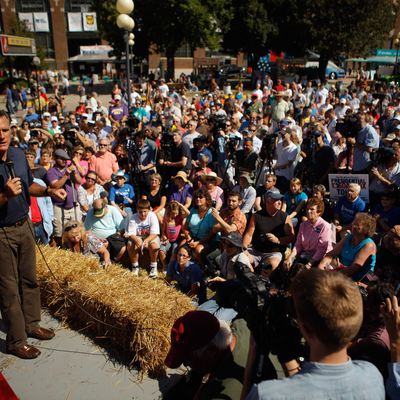
Today the Iowa State Fair begins its 11-day run just outside Des Moines, attracting over a million visitors (in a state whose population is only a bit over 3 million) to an extravaganza of livestock exhibits, concerts, contests, “fair food,” and, because it’s the year before the Iowa Caucuses, politics. The main attraction, as always, will be the Butter Cow (a cow carved from butter) and the associated butter sculptures (this year’s theme is Sesame Street). But 23 presidential candidates will also draw some attention, particularly when each makes a “soapbox” speech (sponsored and livestreamed by the Des Moines Register, Iowa’s still-dominant media presence) followed by questions from, well, any random person who gets close enough to shout one.
Like the Iowa Caucuses themselves, the “soapbox” appearance — a 20-minute gauntlet of pure retail politics in the middle of an inevitably crowded and noisy environment — is semi-obligatory for presidential candidates. Yes, in 2015 Donald Trump skipped the soapbox while giving kids rides on his helicopter, and Hillary Clinton exercised her prerogatives as the then-prohibitive Democratic front-runner to visit the fair without speaking. But this year, all 22 Democrats and one Republican (William Weld) attending the fair are scheduled for the soapbox, beginning with Steve Bullock and Joe Biden this afternoon. The big political day will be this Saturday, when nine speeches kick off with Jay Inslee at 9:00 a.m. and end with Cory Booker at 4:30 p.m. Fairgoers will have the option of “voting” for their favorites at WHO-TV’s “corn kernel poll,” a table where you literally place a kernel of corn in a jar designated for each candidate. In general, presidential candidates are so thick on the dusty ground that you “can’t stir ’em with a stick,” as my wife, a veteran of Iowa politics, likes to put it.
As NBC News notes, the soapbox speeches can get weird:
Veteran Des Moines Register political columnist David Yepsen calls the soapbox speeches “what we think of as old-time politics.” Candidates stand on a small stage — much like the literal soapbox crate candidates of the past used — close to the audience.
“There are some candidates that don’t do it, because they know they may attract a heckler,” Yepsen said. “They know that the cameras are on and you can make mistakes like Mitt Romney did.”
During a speech at the 2011 fair, hecklers shouted at Romney if he would raise taxes on corporations instead of the American people, prompting Romney’s now infamous line “Corporations are people.” In 2015, protesters came within inches of both Chris Christie and Scott Walker.
Speeches aside, candidates are expected to act like regular fairgoers, if regular fairgoers appeared with a retinue of aides, local supporters, and media. Smart candidates will visit the livestock areas, gazing appreciatively at the winner of the Big Boar Contest and strolling the Avenue of Breeds. Food will be sampled, testing the efficiency of advance staff to discern which of the vast offerings of rich and sometimes exotic snacks and meals can be consumed by the candidate without gastrointestinal distress (vegan Cory Booker may need to be especially alert). Candidates are offered an opportunity to flip pork-chops-on-a-stick on the grill at the Iowa Pork Producers tent; in 2015 Ohio governor John Kasich ate three of those greasy delicacies as the cameras whirred.
Generally speaking, candidates will aim to avoid Romney-style gaffes or other embarrassments (eating a corn dog can be particularly perilous, as Michele Bachmann and Rick Perry learned). Even one’s attire can cause problems: Trump drew raised eyebrows for wearing his trademark blazer to the event, and an entire legend grew up around the late Fred Thompson’s 2007 appearance after an allegedly hostile Fox News reporter claimed the candidate had worn Gucci loafers and tooled around the fairgrounds in a golf cart (a big no-no unless you are a major donor to the event; candidates are expected to hoof it like everyone else). Thompson hotly denied these reports, but it fit his languorous campaign so well, it endured as myth.
No, the idea is to get in, get out, check the box, maybe do some other events around the state, and live to fight another day. In 2015, when the luck of the draw put him on the soapbox during a rainstorm, Marco Rubio raced through his remarks in just eight of his allotted 20 minutes. But the same year, Jeb Bush hung around the fair for four full hours, perhaps an omen of his excruciating campaign, which lost ground the longer it lasted. It could be worse: At one point, candidates were expected to throw a baseball in an effort to dunk Bobo the Clown, who spewed abusive, sometimes racist insults in an effort to rattle his adversaries. The insult clown was dunked from the fair for good in 2010. Bobo might, however, have offered some good practice for candidates preparing to deal with Donald J. Trump.






























